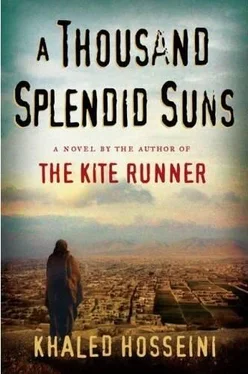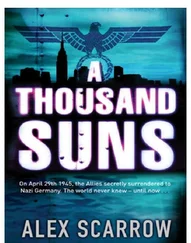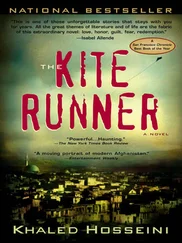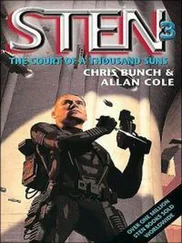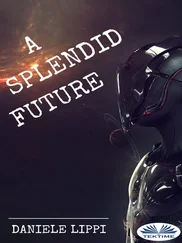Laila fades back to the dark.
ANOTHER FACE. This time a man's. His features seem broad and droopy. His lips move but make no sound. All Laila hears is ringing.
The man waves his hand at her. Frowns. His lips move again.
It hurts. It hurts to breathe. It hurts everywhere.
A glass of water. A pink pill.
Back to the darkness.
THE WOMAN AGAIN. Long face, narrow-set eyes. She says something. Laila can't hear anything but the ringing. But she can see the words, like thick black syrup, spilling out of the woman's mouth.
Her chest hurts. Her arms and legs hurt.
All around, shapes moving.
Where is Tariq?
Why isn't he here?
Darkness. A flock of stars.
* * *
BABI AND SHE, perched somewhere high up. He is pointing to a field of barley. A generator comes to life.
The long-faced woman is standing over her looking down.
It hurts to breathe.
Somewhere, an accordion playing.
Mercifully, the pink pill again. Then a deep hush. A deep hush falls over everything.
Mariam
Do you know who I am?"
The girl's eyes fluttered.
"Do you know what has happened?"
The girl's mouth quivered. She closed her eyes. Swallowed. Her hand grazed her left cheek. She mouthed something.
Mariam leaned in closer.
"This ear," the girl breathed. "I can't hear."
FOR THE FIRST WEEK, the girl did little but sleep, with help from the pink pills Rasheed paid for at the hospital. She murmured in her sleep. Sometimes she spoke gibberish, cried out, called out names Mariam did not recognize. She wept in her sleep, grew agitated, kicked the blankets off, and then Mariam had to hold her down. Sometimes she retched and retched, threw up everything Mariam fed her.
When she wasn't agitated, the girl was a sullen pair of eyes staring from under the blanket, breathing out short little answers to Mariam and Rasheed's questions. Some days she was childlike, whipped her head side to side, when Mariam, then Rasheed, tried to feed her. She went rigid when Mariam came at her with a spoon. But she tired easily and submitted eventually to their persistent badgering. Long bouts of weeping followed surrender.
Rasheed had Mariam rub antibiotic ointment on the cuts on the girl's face and neck, and on the sutured gashes on her shoulder, across her forearms and lower legs. Mariam dressed them with bandages, which she washed and recycled. She held the girl's hair back, out of her face, when she had to retch.
"How long is she staying?" she asked Rasheed.
"Until she's better. Look at her. She's in no shape to go. Poor thing."
IT WAS RASHEED who found the girl, who dug her out from beneath the rubble.
"Lucky I was home," he said to the girl. He was sitting on a folding chair beside Mariam's bed, where the girl lay. "Lucky for you, I mean. I dug you out with my own hands. There was a scrap of metal this big-" Here, he spread his thumb and index finger apart to show her, at least doubling, in Mariam's estimation, the actual size of it. "This big. Sticking right out of your shoulder. It was really embedded in there. I thought I'd have to use a pair of pliers. But you're all right. In no time, you'll be nau socha. Good as new."
It was Rasheed who salvaged a handful of Hakim's books.
"Most of them were ash. The rest were looted, I'm afraid."
He helped Mariam watch over the girl that first week. One day, he came home from work with a new blanket and pillow. Another day, a bottle of pills.
"Vitamins," he said.
It was Rasheed who gave Laila the news that her friend Tariq's house was occupied now.
"A gift," he said. "From one of Sayyaf s commanders to three of his men. A gift. Ha!"
The three men were actually boys with suntanned, youthful faces. Mariam would see them when she passed by, always dressed in their fatigues, squatting by the front door of Tariq's house, playing cards and smoking, their Kalashnikovs leaning against the wall. The brawny one, the one with the self-satisfied, scornful demeanor, was the leader. The youngest was also the quietest, the one who seemed reluctant to wholeheartedly embrace his friends' air of impunity. He had taken to smiling and tipping his head salaam when Mariam passed by. When he did, some of his surface smugness dropped away, and Mariam caught a glint of humility as yet uncorrupted.
Then one morning rockets slammed into the house. They were rumored later to have been fired by the Hazaras of Wahdat. For some time, neighbors kept finding bits and pieces of the boys.
"They had it coming," said Rasheed.
THE GIRL WAS extraordinarily lucky, Mariam thought, to escape with relatively minor injuries, considering the rocket had turned her house into smoking rubble. And so, slowly, the girl got better. She began to eat more, began to brush her own hair. She took baths on her own. She began taking her meals downstairs, with Mariam and Rasheed.
But then some memory would rise, unbidden, and there would be stony silences or spells of churlishness. Withdrawals and collapses. Wan looks. Nightmares and sudden attacks of grief. Retching.
And sometimes regrets.
"I shouldn't even be here," she said one day.
Mariam was changing the sheets. The girl watched from the floor, her bruised knees drawn up against her chest.
"My father wanted to take out the boxes. The books. He said they were too heavy for me. But I wouldn't let him. I was so eager. I should have been the one inside the house when it happened."
Mariam snapped the clean sheet and let it settle on the bed. She looked at the girl, at her blond curls, her slender neck and green eyes, her high cheekbones and plump lips. Mariam remembered seeing her on the streets when she was little, tottering after her mother on the way to the tandoor, riding on the shoulders of her brother, the younger one, with the patch of hair on his ear. Shooting marbles with the carpenter's boy.
The girl was looking back as if waiting for Mariam to pass on some morsel of wisdom, to say something encouraging. But what wisdom did Mariam have to offer? What encouragement? Mariam remembered the day they'd buried Nana and how little comfort she had found when Mullah Faizullah had quoted the Koran for her. Blessed is He in Whose hand is the kingdom, and He Who has power over all things, Who created death and life that He may try you. Or when he'd said of her own guilt, These thoughts are no good, Mariam jo. They will destroy you. It wasn't your fault. It wasn't your fault.
What could she say to this girl that would ease her burden?
As it turned out, Mariam didn't have to say anything. Because the girl's face twisted, and she was on all fours then saying she was going to be sick.
"Wait! Hold on. I'll get a pan. Not on the floor. I just cleaned… Oh. Oh. Khodaya. God."
THEN ONE DAY, about a month after the blast that killed the girl's parents, a man came knocking. Mariam opened the door. He stated his business.
"There is a man here to see you," Mariam said.
The girl raised her head from the pillow.
"He says his name is Abdul Sharif."
"I don't know any Abdul Sharif."
"Well, he's here asking for you. You need to come down and talk to him."
Laila
Laila sat across from Abdul Sharif, who was a thin, small-headed man with a bulbous nose pocked with the same cratered scars that pitted his cheeks. His hair, short and brown, stood on his scalp like needles in a pincushion.
"You'll have to forgive me, hamshira," he said, adjusting his loose collar and dabbing at his brow with a handkerchief "I still haven't quite recovered, I fear. Five more days of these, what are they called… sulfa pills."
Читать дальше
